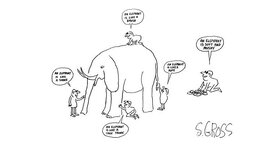The
Christ myth theory concerns the question of whether
Jesus of Nazareth was a mythological figure or a historical one. While Christ myth theory and
Jesus myth theory are often used as synonyms, this page uses the former as a broader umbrella term.
One of the biggest problems with the "Christ myth" is what it actually means is all over the freaking map largely because Volney and Dupuis had different views regarding the Christ myth, which resulted in a large range of ideas being called "
Jesus myth theory", "Christ myth theory", or "Ahistorical Jesus" (including ones that accept Jesus existed as a human being). Alternatively, Neil Godfrey gives the following definition:
A Christ mythicist is one who believes the literal truth of the myth of Jesus Christ as set out in the epistles and gospels of the New Testament, or who believes that those myths, even if they have only limited or no historical foundation, nonetheless contain symbolic or spiritual value for those of the Christian faith.
[2]
Which echoes the 1909 definition given by
John Remsburg:
[T]he Christ is understood [as] the Jesus of the New Testament. The Jesus of the New Testament is the Christ of Christianity. The Jesus of the New Testament is a supernatural being. He is, like the Christ, a myth. He is the Christ myth.
[3]
[...]
Historicists v. Biblicists and Jesus v. Christ (god-Jesus)
Per the canonical gospels,
Historicists assert that these literary narratives featuring "fancy_god-Jesus" contain biographical data for the historical personage Jesus Bar-
Joseph/
Pantera (i.e. "plain_Jane-Jesus" a real historical person) that can be extracted.
[9]
For
Biblicists, the gospels are fictional narrative literature (a genre of
historical fiction) and do not support a historical figure from the literary
protagonist character named Jesus. But a historical Jesus of some sort probably existed.
[note 1]
Christ is a second-god, is the only-begotten son of First-god (YHWH), was incarnated in a virgin (Mary) and crucified for us. The Nicene Creed, the most widely accepted confession of the Christian faith (but not the only one), explains that this god will appear on Earth at the end of days to judge the living and the dead.
Academic criticism of the Christ myth
| “”Strauss arrived at a Christianity depersonalized and anonymous, reducing Jesus to nothing more than a gifted genius whom legend had gradually deified. In this account, the Christian faith could be explained without reference to the Jesus of history. Strauss in this way firmly stayed on the side of the negative critique. He did not arrive at a historical core of the life of Jesus… |
| —Elisabeth Hurth [11] |
Arguably every modern biblical scholar who is not a devotee of the
god called Lord Jesus Christ,
[12] holds that Christ is a myth,
[note 2]
The academic criticism of Christian
dogma in the belief of Jesus' immortality and incarnation is commonly held to originate in 1835 with
David Strauss.
[16] In 1941,
Rudolf Bultmann promoted the abstraction of the Christ myth by
demythologization.
[17]
It makes as much sense to call Strauss (who denied the fantastical assertion of a Christ's existence, i.e. the fictional lord of the Christian church) a "Christ mythicist"… as it does to call someone a "Unicorn mythicist" for denying that Unicorns exist. A 1910 syndicated news report noted "the mythical theory of Strauss".
[
Arthur Drews] laid down his theories after the classic manner of old time university disputations. The gist of his position in large measure was like the mythical theory of David Strauss, which created a sensation fifty years ago. Strauss held there was
verity in the historic Christ, but that the vast mass of miracle and supernatural wonders had been woven like wreaths around the head of Jesus. Drews goes further. He alleges there never was such a person as Jesus of Nazareth.
[18][19]
--
"Christ myth theory".
RationalWiki.

